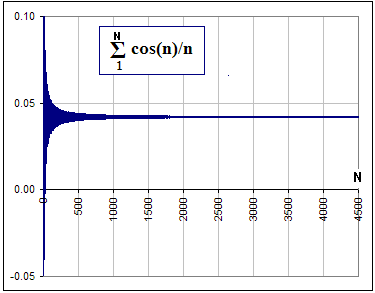| a Trig Sum |
Here's the problem:
| Does Σ cos(n)/n converge ... where the sum is from n = 1 to n = ∞? |
| >Lookin' at Figure 1, I'd say yes.
Can you prove it? >Me? You kidding?
If the sequence an is decreasing and has a limit of 0 >I pick an = 1/n because it decreases to 0. Right?
>Then you gotta prove that Σ cos(n) is bounded. |  Figure 1 |
Then Σ ein = Σ cos(n) + i Σ sin(n).
But Σ ein is a geometric series with a common ratio of ei so its sum (from n = 1 to n = N) is: ei(1 - eiN) / (1 - ei)
>Huh?
Remember? a + ar + ar2 + ... + arN-1 = a (1 - rN)/(1 - r). In our case, a = r = ei.
Okay, so what's an upper bound on |Σcos(n)| ?
>I give up.
|Σcos(n)| < |Σ cos(n) + i Σ sin(n)|
= |Σein|
= |Σ ei(1 - eiN) / (1 - ei)|
< |ei||1 - eiN| / |1 - ei|
< 2/|1 - ei| = 1/SQRT[1 - cos(1)]
since 1 - ei = 1 - cos(1) - i sin(1) has a magnitude of SQRT[(1 - cos(1))2 + sin2(1)] =SQRT[ 2 - 2 cos(1)].
>Okay, so Σ cos(n)/n converges ... but to what?
Mark S. provided this neat result: Setting x = ei we get:
Then Σcos(n)/n = -RealPart{ Σein/n }
= -RealPart{ log(1 - But the log of a complex number R eiθ is just log(R) + iθ so the RealPart is just log(R).
Note that: 1 - ei = 1 - cos(1) - i sin(1) = R eiθ with R = SQRT[ (1 - cos(1) )2 + sin 2(1) ] = SQRT[ 2 - 2 cos(1) ].
So (finally):
Σ cos(n)/n = - log(R) = - log[ SQRT[ 2 - 2 cos(1) ]] = 0.04202.
>Just like Figure 1, eh?
See Math Stuff
I have no idea.

Note that (Taylor series, eh?):
ei) }
Σxn/n = -log(1 - x).
Σxn/n = Σein/n = -log(1 - ei).
It looks that way, don't it. 
